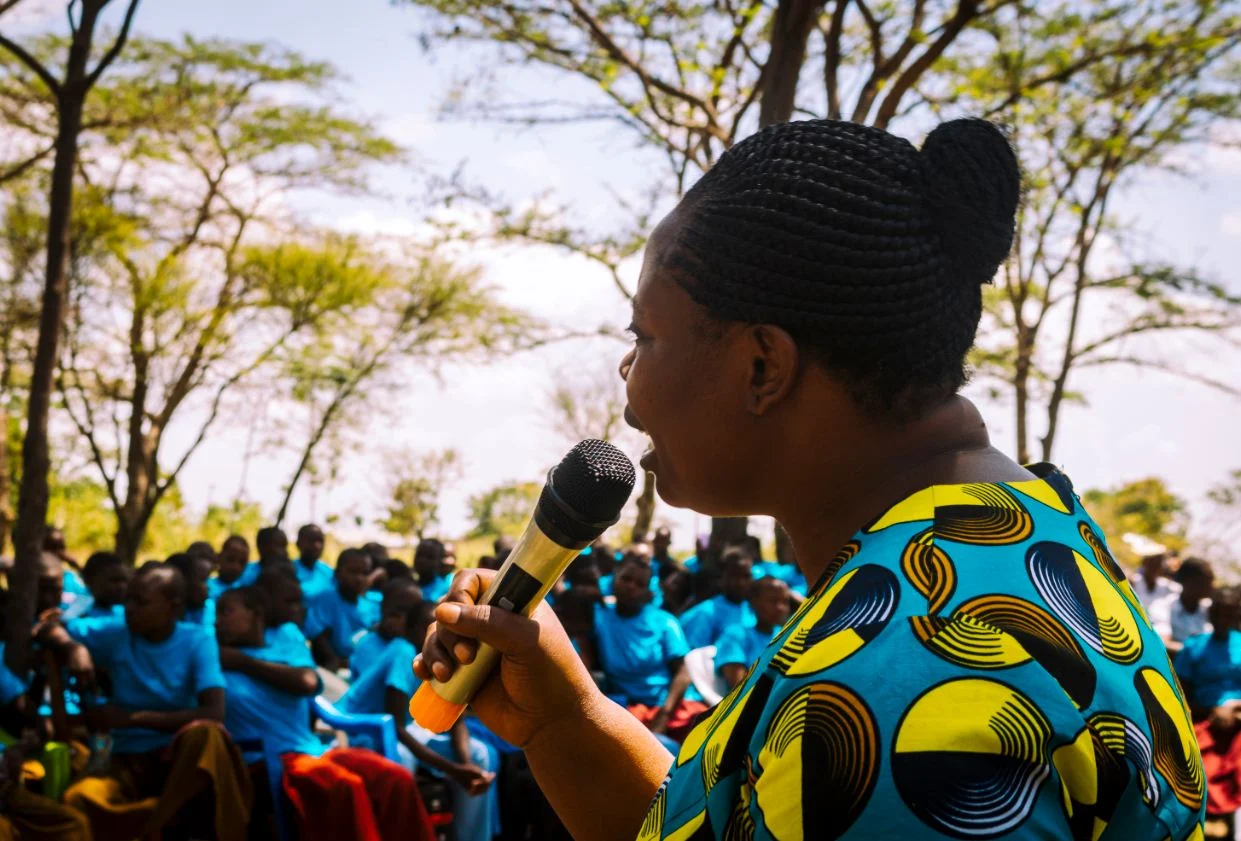"Msichana
hodari ninajitambua, ninajiamini nina ndoto kubwa.
Msichana onesha uwezo wako."
"A strong girl, I know myself,
I believe in myself, I have big dreams.
Girl, show your strength."
Frida Mollel, Head of COP at Grumeti Fund, said
"[girls] have to know the circumstances hindering their success in order
to face them. Compared to their male counterparts, many challenges stand
between them and education; early marriages, teenage pregnancies, FGM. But we
want them to know that being a girl is not bad luck or crippling. You can be a
girl and do great things in this world."
Frida's sentiments were echoed in the keynote
speech by Rebeca Gyumi. Rebeca urged the girls not to be defined by their
circumstances, and to be confident and assert their rights, especially their
right to education. She told the girls that the changes they seek shall come
from them. [They] should refuse to be part of the statistics of women who are
mutilated or married at an early age.
Rebeca’s own work and life story typify her advice.
She is a lawyer by profession and her organization, Msichana Initiative, is at
the forefront of advocating for girls' rights in Tanzania. She believes that
our society's perspective of a girl child needs to change, and parents need to
realize their role in catalysing children success. She said, "A child's
potential is reached by building their knowledge and competence, and that can
only be achieved through education. So, parents need to be the biggest
champions of education."
To further inspire and support girls to stay
their course, Rhobi Samweli, Founder and Director of Hope for Girls and Women
in Tanzania, shared her personal story. She was mutilated at a young age and
grew up to establish a Safe House for young girls fleeing FGM in Mara region.
At the end of her speech, the girls joined Rhobi in saying no to FGM with the
war cry, "ukeketaji basi." Later Mary Mwakyusa, a reproductive health
specialist at Jhpiego, spoke to the girls about reproductive health and
menstruation hygiene.
At the end of the sessions, the Grumeti Fund
gave each girl a year’s supply of reusable pads. Ms Teddy, a teacher at
Manchira Secondary School, expressed how this contribution will improve girls’
retention because more girls will feel comfortable and confident to attend
school.
In agreement, Asteria, a student at Ikoma
secondary school, said that "When a girl doesn't have sanitary towels, it
really affects her confidence. She can stop showing up to classes, which
affects her academic success, and then she does not reach her dreams."
When asked to share their takeaways from the
sessions, Joanitha, a student from Bunda Secondary School, said that this was
an excellent platform for girls "to share ideas, inspire and empower each
other, and do activities together." Juanita also said she cannot wait to
share her learnings with other girls so that they can also be inspired to reach
their dreams. Pauline, a fellow student from Issenye Secondary School, added
that "girls can continue to show respect in their communities while also
standing up for their rights." Around the world, the next generation of girls
are determined to speak up against injustices and are amplifying each other's
voices in their cry for justice. They are spreading a message of confidence and
solidarity in achieving equality, despite a number of challenges along the way. How are you united in this course, share your
tuko pamoja (we are together) moment by tagging @grumetifund #tukopamoja
#girlpower.
Around the world, the next generation of girls
are determined to speak up against injustices and are amplifying each other's
voices in their cry for justice. They are spreading a message of confidence and
solidarity in achieving equality, despite a number of challenges along the way. How are you united in this course, share your
tuko pamoja (we are together) moment by tagging @grumetifund #tukopamoja
#girlpower. 



















No comments:
Post a Comment